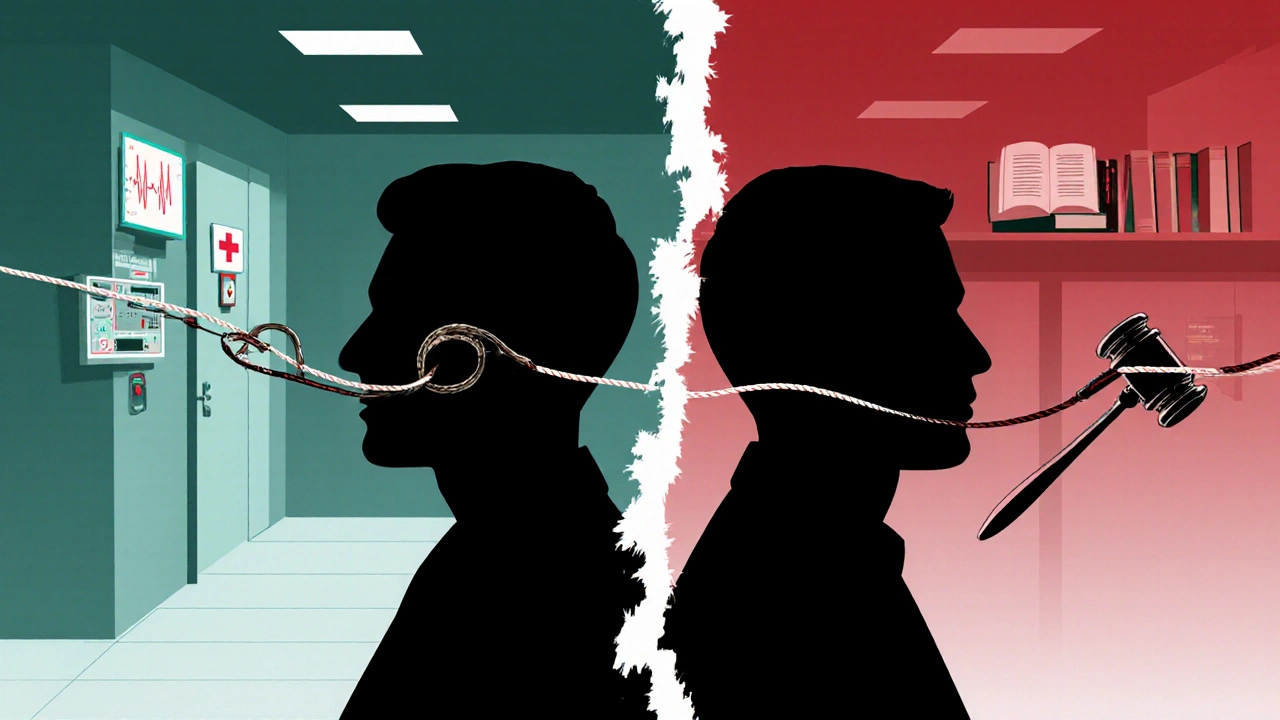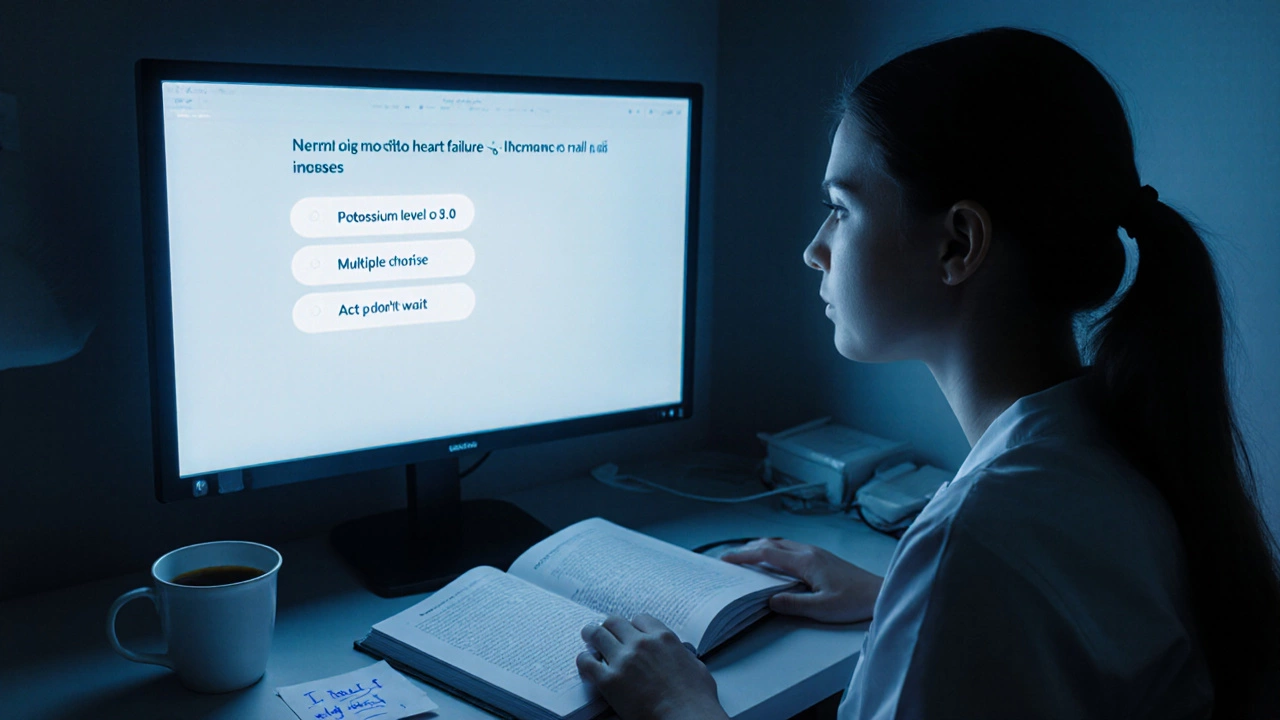Exam Strengths Quiz
Which Exam Matches Your Strengths?
Answer 5 questions to discover if the NCLEX or bar exam suits your decision-making style better. This tool is based on the article's key insight: neither exam tests intelligence—it tests preparation strategy.
1. A patient has chest pain and a fever. What's your immediate action?
2. You need to recall the rule for hearsay exceptions. What's your approach?
3. During a time-pressured exam, how do you handle uncertainty?
4. Your study approach is:
5. When facing a difficult exam question:
Every year, thousands of nursing graduates and law school grads face the same question: Is the NCLEX harder than the bar exam? It’s not just curiosity-it’s fear. You’ve spent years studying, sacrificing sleep, and burning through coffee. Now you’re staring down a test that can end your career before it starts. But comparing these two exams isn’t like comparing apples and oranges. It’s like comparing a marathon to a high-wire act. Both are brutal. Both require precision. But they break you in different ways.
The NCLEX: A Test of Clinical Judgment, Not Memorization
The NCLEX doesn’t ask you to recite drug dosages or recall every step of the nursing process from memory. That’s the myth. The real NCLEX, especially the NCLEX-RN, uses computerized adaptive testing (CAT). That means the questions change based on how you answer. If you get a question right, the next one gets harder. Miss one? The system lowers the difficulty. The goal isn’t to answer every question correctly-it’s to prove you can make safe, smart decisions when the stakes are life or death.
Most test-takers fail because they treat it like a multiple-choice quiz. They study facts. But the NCLEX asks: What’s the priority? A patient with chest pain and a fever? Do you check their vitals first, or give them aspirin? Do you call the doctor, or wait for orders? The right answer isn’t always the most obvious one. It’s the one that prevents harm. The exam uses real clinical scenarios-some from actual patient charts. You’re not just choosing an answer. You’re choosing a course of action.
Pass rates tell the story. In 2024, the first-time pass rate for U.S.-educated NCLEX-RN candidates was 87.5%. That sounds high, but it hides the truth: nearly 1 in 8 nursing grads didn’t pass on the first try. And for those who failed, the average time between attempts was 54 days. That’s not just retaking a test-it’s rebuilding your confidence.
The Bar Exam: A Marathon of Memorization Under Pressure
The bar exam is different. It’s not adaptive. It’s not about clinical judgment. It’s about how much you can hold in your head and regurgitate under time pressure. The Uniform Bar Exam (UBE), used in most states, has three parts: the Multistate Bar Exam (MBE), the Multistate Essay Exam (MEE), and the Multistate Performance Test (MPT). You’re tested on 14 subjects-from constitutional law to community property. Some states add their own local laws on top.
The MBE alone has 200 multiple-choice questions. You get 60 minutes for every 50 questions. That’s 72 seconds per question. And you’re not just picking the right answer-you’re picking the *best* answer among four that all sound plausible. One wrong assumption, one misremembered rule, and you lose the point.
Essay questions demand you write like a lawyer: precise, structured, and packed with legal doctrine. You have 30 minutes per essay. No time to think. No time to edit. You have to know the rules cold-and know how to apply them fast. The MPT is even trickier. You’re given a file and a library of cases, and you have to write a memo or brief in 90 minutes. No outside research. Just what’s in front of you. And you’re graded on how well you organize, analyze, and apply the law-not how eloquent you are.
Pass rates? In 2024, the overall pass rate for first-time takers was 74%. That’s lower than the NCLEX. But here’s the catch: bar exam takers are often older, working full-time, and juggling families. Many are retaking it for the second, third, or fourth time. The stress isn’t just academic-it’s financial. A failed bar exam can delay licensure by a year. And in some states, you can’t practice law until you pass.

What Makes One Harder Than the Other?
Hardness isn’t about difficulty. It’s about what you’re being tested on-and what kind of pressure you can handle.
The NCLEX is harder if you’re not used to thinking on your feet. If you’re the kind of person who studies hard but freezes when faced with a real-world decision, you’ll struggle. The exam doesn’t care if you know every drug interaction. It cares if you know which patient to help first. You can memorize everything and still fail because you picked the wrong priority.
The bar exam is harder if you’re not a detail-oriented memorizer. If you can’t recall the elements of negligence or the rules for hearsay without reviewing them 10 times, you’re in trouble. The bar doesn’t test judgment-it tests recall. And it tests it under insane time pressure. You’re not just learning law. You’re learning how to perform it like a machine.
One is about instinct. The other is about accuracy.
Here’s a real example: A nursing student passes all her clinical rotations with straight A’s. She knows how to check a central line, manage insulin drips, and recognize sepsis. But on the NCLEX, she gets a question: A patient with heart failure has a new order for furosemide. The nurse notices the patient’s potassium level is 3.0. What should the nurse do first? She knows furosemide lowers potassium. She knows 3.0 is dangerous. But the options are: A) Call the doctor, B) Administer the furosemide, C) Hold the medication and notify the provider, D) Give a potassium supplement. The right answer isn’t C-it’s D. Why? Because giving the diuretic could kill the patient. But she picked C, thinking, “I should call the doctor.” That’s a classic trap. The NCLEX wants you to act, not wait.
On the bar exam, a law grad might know the rule about contract formation. But if she misremembers the Statute of Frauds and writes that an oral contract for land is enforceable, she loses points-even if her analysis is otherwise perfect. The bar doesn’t reward effort. It rewards precision.
Which One Has a Higher Failure Rate?
Statistically, the bar exam has a lower pass rate. But that’s misleading.
NCLEX pass rates are higher because most test-takers are recent graduates who’ve just finished a rigorous program. They’re fresh, focused, and often study full-time for a few weeks before the test.
Bar exam takers? Many are working as paralegals, managing families, or paying off student loans. Some take it six months after graduation. Others wait two years. Their minds aren’t in law school mode anymore. They’re rusty. And retakes are common-nearly 30% of people fail the first time. Some fail twice. A few fail three times.
So while the NCLEX’s 87.5% pass rate looks better, the bar’s 74% hides a deeper problem: the cost of failure is higher. One failed NCLEX means a delay. One failed bar exam can mean a career reset.

What You Really Need to Pass
Both exams require more than studying. They require mindset.
For the NCLEX: You need to trust your clinical instincts. Stop thinking like a student. Start thinking like a nurse. If something feels off-act. Don’t wait for orders. Don’t second-guess. The exam rewards decisive, safe action. Use practice questions that mimic real scenarios. Don’t just read rationales. Ask yourself: What would I do right now?
For the bar exam: You need to build a mental filing cabinet. Flashcards. Mnemonics. Repetition. You need to drill until the rules are automatic. Practice timed essays. Learn the structure. Memorize the frameworks. You don’t need to be brilliant-you need to be consistent. The bar doesn’t reward creativity. It rewards predictability.
And here’s the truth most people don’t tell you: Neither exam tests how smart you are. They test how well you prepare. The person who passes isn’t necessarily the one who studied the most. It’s the one who studied the right way.
Final Thought: It’s Not About Which Is Harder
It’s about which one matches your brain.
If you’re a quick thinker, calm under pressure, and good at making decisions with incomplete info-you’ll handle the NCLEX better.
If you’re a detail freak, obsessive about rules, and can sit for hours memorizing lists-you’ll thrive on the bar.
Don’t waste energy comparing them. Focus on what you need to do next.
For the NCLEX: Get a question bank with rationales. Do 50 questions a day. Focus on priority-setting. Watch videos on nursing logic-not anatomy.
For the bar: Use a bar prep course. Drill MBEs. Write 2 essays a day. Learn the IRAC method. Don’t try to understand everything-just learn how to answer.
Passing isn’t about being the smartest. It’s about being the most prepared.
